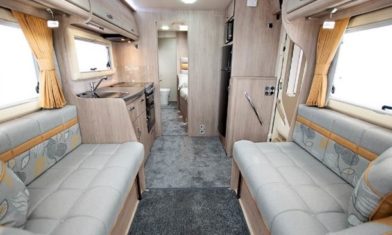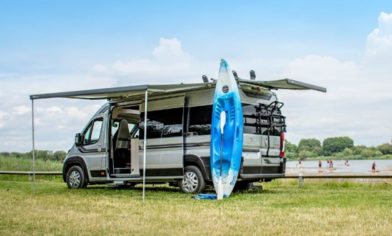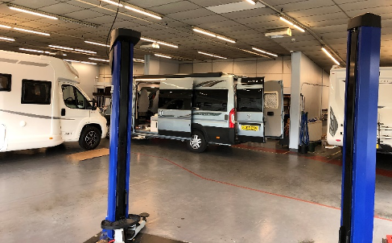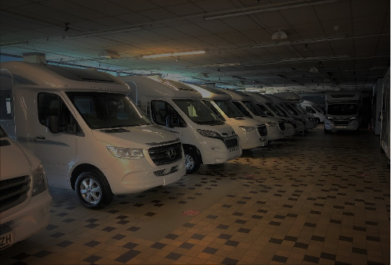There’s a very good chance that you spent a tidy sum when buying your motorhome. Just like any expensive asset, therefore, it makes sense to protect it by ensuring that it’s regularly serviced.
Professional motorhome servicing is the way to do that, and both part-exchange and private motorhome sale values may typically be increased if you can provide a full-service history for your preloved vehicle.
It’s not only a question of finance
Important as the financial considerations might be, we don’t want to labour too much the financial logic behind regular motorhome servicing. That’s because we believe there’s another far more critical imperative for regular and attentive servicing – and that is safety.
In several important respects, there is simply no comparison between a standard car and a motorhome. True, both machines need attention to matters such as engine and basic mechanical servicing and maintenance. It would be dangerous and possibly even illegal to drive any vehicle on the road that was not in a safe, roadworthy condition.
However, in the case of a motorhome, you’re not just driving it but living in it at times too.
So, you’re typically going to have electrical systems for lighting, possibly heating, and cooking. It’s also possible that you’ll be using gas for some or several of those purposes. You’re also going to have water systems aboard and possibly some waste disposal functionality.
Water, electricity, gas, heating, and waste – taken together they represent pretty much the whole package of household-type infrastructure services.
The mechanics
As with any motor vehicle, the law says that you must arrange for an MOT test on the third anniversary of your motorhome’s first registration and every year afterwards. It is illegal to circulate any vehicle that requires one without a valid MOT certificate – on penalty of a fine of up to £1,000.
But just as with the MOT certificate for any motor vehicle, it confirms the basic roadworthiness of your motorhome on the date it was tested only. It is your responsibility under the law to make sure that it remains in a roadworthy condition throughout the rest of the year – if you do not, you risk invalidating your motor insurance as well as attracting the unwanted attention of the police.
Regular servicing and maintenance by a reputable dealer, therefore, may spot any potential problems before they develop and keep you and other road users safe on the highway.
Maintenance
In our view, a thorough service isn’t something that can be done on a quick-and-cheap or DIY basis. It must be done right – leaving little or nothing to chance. So, of course, there is some cost involved. Yet avoiding that cost might prove to be dangerous. We don’t think it’s even worth contemplating.
From our extensive experience, we know just how much effort modern motorhome and campervan manufacturers go to when trying to ensure their vehicles are safe to drive and occupy when in use.
Yet all of us know that it doesn’t matter what design and engineering excellence have been applied to machines and their systems, normal wear and tear can still cause problems to arise. Maintenance is ideally all about spotting potential problems and removing that potential rather than fixing a problem once it has occurred.
That’s why a thorough professional motorhome servicing needs to examine:
- all the electrical systems including pin plugs, cables, your road lights, earthing systems, and so on;
- your fire safety provisions, potentially covering smoke) and carbon monoxide) detectors, fire blankets, extinguishers, appliances, and the like;
- the water systems, including pumps, pressure devices, filters, taps, any water tanks, WC, drainage, and so on;
- very importantly – your gas systems. As the UK’s Registered Gas Engineer advised in a posting on the 26th of May 2021, checks should cover looking for any potential gas leaks, all appliances, regulator valves, cylinders, hoses (and clips) plus flues and ventilation;
- the bodywork – including the vehicle’s windows, doors, roof, number plates, all furniture, blinds, flooring, screens, and while you’re at it, you might also test for damp penetration; and
- the basic mechanics of the vehicle including its undercarriage, chassis, coupling head, all tyre pressures and depth of treads, and so on.
Living in comfort – the interior
The process of keeping the interior of your motorhome spick, span, healthy, and hazard-free is known as a habitation service – and the Wandering Bird website weighs up the pros and cons of having such a habitation service done each year.
It involves a thorough servicing, inspection, repair, and maintenance of the electrical, gas, heating, and water systems in your motorhome, together with an overall service of the whole of the living and sleeping areas.
In that process, a habitation service provides an essential health and safety check and may also help to detect longer-term issues – such as mould and damp – before they spread to become especially expensive problems to resolve.
If you have a slightly older motorhome – or one that you are not using regularly – the drinking water system is likely to be especially vulnerable to the build-up of potentially harmful bacteria. Your habitation service, therefore, is likely to include flushing out the entire water system with an antibacterial solution.
In between services, you may help to keep your drinking water somewhat safer by using it regularly or at least running off some of the stored water and refilling it.
Motorhome servicing by specialists
When it comes to making sure your motorhome is in tip-top condition, you want someone you can trust. And here at Derby Motorhomes, we are big on servicing. We want to ensure your motorhome is above all safe, but that everything from the mechanics to the onboard electrics and gas is also working correctly. Winning your peace of mind is paramount.
The very nature of a motorhome makes it a specialist vehicle and second home. That calls for specialist attention, of course, and you might want to make sure that you commission a known and trusted dealer – such as ourselves – to take care of your servicing and maintenance requirements. We can do just that whether or not you bought your motorhome from us.
If you are fortunate enough to own an Auto-Sleeper, for instance, you may want the reassurance and confidence of knowing your servicing is being carried out according to the manufacturer’s specifications.
Peace of mind
Ensuring things are as they should be with all gas and electric appliances is our first port of call. Having a service is one thing, and mechanical servicing is straightforward. Or at least it should be.
We want to put your motorhome to the test and make sure that all the habitation checks are carried out professionally. Also, in a manner that will give any of our customers’ real peace of mind.
Regular servicing and maintenance – of both the mechanical and interior aspects – of your motorhome is, therefore, an important route to prolonging its working life and keeping you and its occupants safe and free from potential harm to your health.


 Whilst we would appreciate our visitors making an appointment to visit, we aren’t going to insist on this but please rest assured, we are each still taking every reasonable precaution possible to ensure the safety of our staff and customers.
Whilst we would appreciate our visitors making an appointment to visit, we aren’t going to insist on this but please rest assured, we are each still taking every reasonable precaution possible to ensure the safety of our staff and customers.




 Our dealership is currently closed due to the national restrictions in place and our sales and service customers have all been extremely understanding regarding the current situation and although unfortunately, everyone is in the same boat so to speak and some of you will have problems or outstanding issues with your motorhomes and possibly feel frustration at not being able to resolve these problems, I can assure you all that here at least, we would all rather be working hard, helping our customers and not being forced to sit around at home twiddling our thumbs!
Our dealership is currently closed due to the national restrictions in place and our sales and service customers have all been extremely understanding regarding the current situation and although unfortunately, everyone is in the same boat so to speak and some of you will have problems or outstanding issues with your motorhomes and possibly feel frustration at not being able to resolve these problems, I can assure you all that here at least, we would all rather be working hard, helping our customers and not being forced to sit around at home twiddling our thumbs! Although we all appreciate that our dealership has to remain closed during lockdown #3, for me the saddest sight that I see most days (and the one I simply can’t get used to) is the image of our great big showroom, full of new and used motorhomes, in darkness and gloom.
Although we all appreciate that our dealership has to remain closed during lockdown #3, for me the saddest sight that I see most days (and the one I simply can’t get used to) is the image of our great big showroom, full of new and used motorhomes, in darkness and gloom.